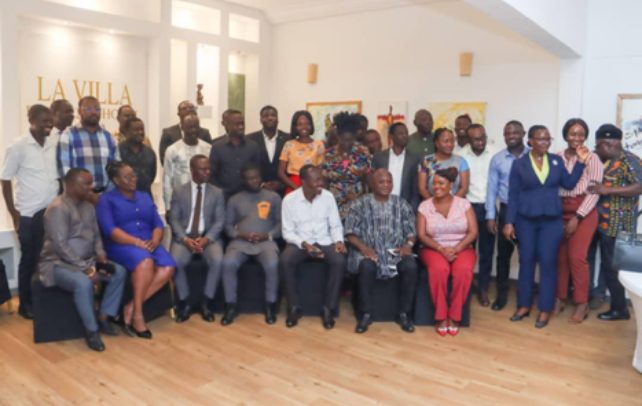FWSC Officials with media representatives
The Fair Wages and Salaries Commission (FWSC) has hosted a media soiree, a strategic engagement forum to foster effective collaboration and open communication with the media and to clarify issues related to fair wages and salaries in the public service.
The event aims to commemorate the commission’s notable achievements and strengthen its partnership with the media
The FWSC is a mandated organisation for the determination and management of salaries, benefits and allowances for all public servants, drawn from the Consolidated Fund and it is committed to excellence and transparency in salary administration.
Highlighting the Commission’s significant achievements in 2024, Chief Executive of FWSC, Ing Benjamin Arthur stated that, the FWSC had successfully implemented the Single Spine Salary Structure (SSSS), a significant achievement in promoting fairness and efficiency in public sector compensation.
Moreover, he noted that, the FWSC had completed and signed negotiation with 44 unions and institutions, demonstrating their commitment to collaborative labour relations.
Furthermore, he added that, the FWSC had achieved a significant savings of GHc345 million through its Nationwide Payroll Monitoring Exercise.
The accomplishment, he said, underscores the FWSC’s dedication to promoting fairness, efficiency and transparency in Ghana’s public sector compensation framework.
Despite these achievements, Ing. Arthur stated that, “we have faced challenges in the labour front due to the circumstances of 2024 being an election year, also, there were 14 industrial actions within the year and all have being called off.
“But we would continue to engage with unions and stakeholders to address concerns and promote peaceful labour relations,” he said.
He expressed a warm gratitude to the media for their tireless efforts in promoting transparency and accountability in the country, adding that, their role is invaluable.
Director of Salary Administration, Cephas Amada, explained to the media practitioners that the Single Spine Pay Policy aims to attract and retain employees with critical skills while enabling the government to control the public sector wage bill.
Also, he added that the vision of the Commission is to become a world-class reference centre in pay administration, promoting fairness, equity and transparency in public services compensation and benefits.
For her part, the Director of Performance Management, Dr. Baaba Anquandah, spoke about an ongoing initiative to link pay to employee’s performance and productivity in the country’s public service.
According to her, the Commission per Section 3(i) of the FWSC Act, 2007 (Act 737) was to ensure that the public service pay system reflects internal consistency, external competitiveness and employee performance.
She noted that, “this would be in line with best practices, since the rise in the public service wage must result in productivity gains for the country’s growth”.
By Janet Odei Amponsah


